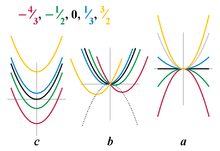
For the case of more than one variable, see Conic section or Quadratic form.
In elementary algebra, a quadratic equation (from the Latin quadratus for "square") is any equation having the form
where x represents an unknown, and a, b, and c represent known numbers such that a is not equal to 0. If a = 0, then the equation is linear, not quadratic. The numbers a, b, and c are the coefficients of the equation, and may be distinguished by calling them, respectively, the quadratic coefficient, the linear coefficient and the constant or free term.
Because the quadratic equation involves only one unknown...